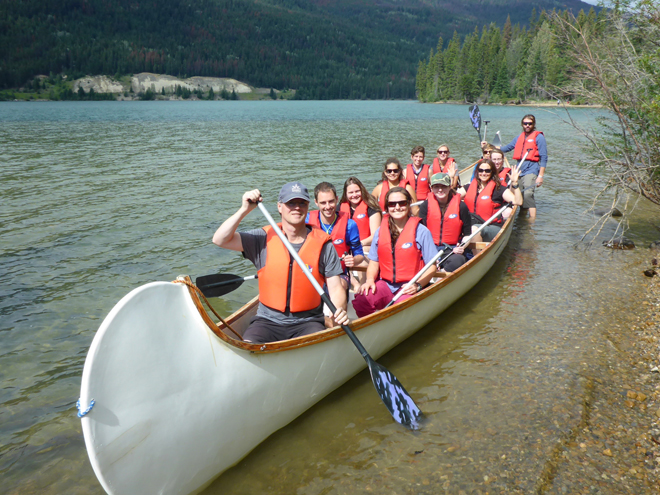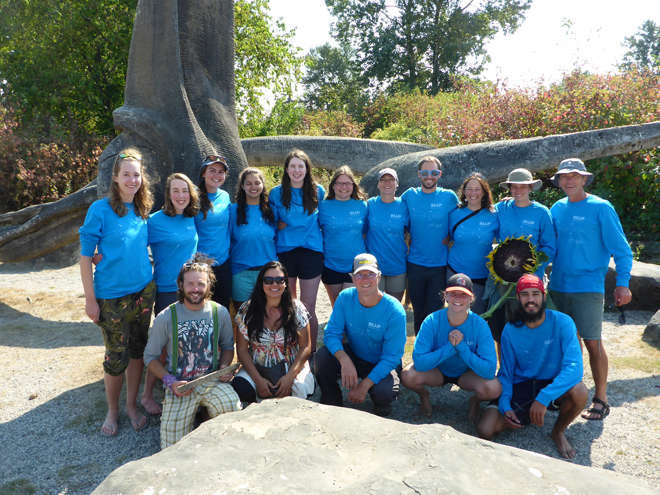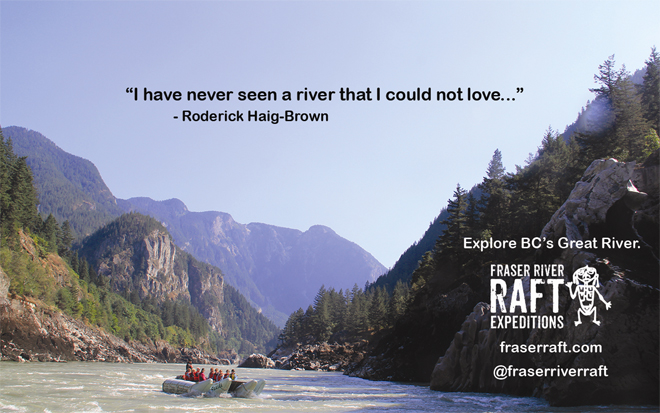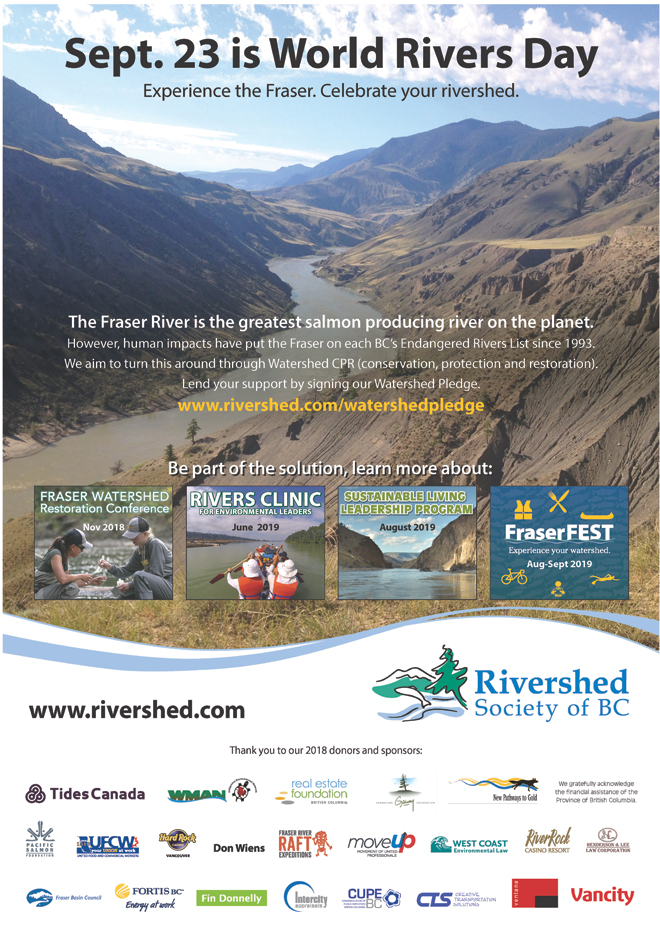“Rivers are the arteries of our planet; they are lifelines in the truest sense.”
~ Mark Angelo
On September 23, communities all over the planet will celebrate World Rivers Day. The day focuses on highlighting the value of rivers, aiming to increase awareness and encourage river stewardship around the world.

In BC, we are blessed with an abundance of wild rivers, including the Fraser River, which is the longest, free-flowing river in the province, stretching 1,375 km and draining some 234,000 square kilometres. It is the most productive salmon watershed on the planet and the most economically important watershed in Canada. In 1998, the Fraser River was designated a Canadian Heritage River for its remarkable cultural and natural heritage.
The Fraser River was named after explorer Simon Fraser, and for the past 10,000 years has remained a route of travel and a source of food for Indigenous peoples. Today, the Fraser River Basin faces numerous environmental threats including urban development, contamination from pulp and paper mills, urban and agricultural runoff, resource extraction, and industrial mining. These issues threaten the river’s salmon and ecology, and the cultural traditions practised along its waters.
The Fraser River begins in the Rocky Mountains within the boundaries of Mount Robson Provincial Park and ends in the Fraser River estuary in the Strait of Georgia in Vancouver.
This summer, on August 2, a group of leaders embarked on a trip of a lifetime down the Fraser River from its headwaters to the sea on the Rivershed Society of BC’s (RSBC) annual Sustainable Living Leadership Program (SLLP). The SLLP was co-created by RSBC’s founder and chair, Fin Donnelly, after his second 1,400-km swim of the Fraser River in 2000, which raised awareness about the issues affecting this vitally important river.
From the journey’s starting point in the Robson Valley, the SLLP participants paddled, hiked, and rafted for 27 days. During that time, each participant designed a project plan for their sustainability projects, which needed to address an element of Rivershed CPR—conservation, protection, or restoration. These projects are to be implemented in the participants’ respective communities at the conclusion of their journey. During their river adventure, the SLLP participants engaged in learning and leadership activities, visited places of interest, met community members, engaged in protecting and advocating for areas in the Fraser watershed, presented their project plans to communities along the Fraser, and participated in 11 FraserFEST community dinners.
The SLLP has run 14 times since its inception in 2002, with over 100 graduates who have gone on to work in their communities and lead the way for positive change.
This year’s participants came to the river with a vision for the future and a passion to be a voice for sustainability. Each shared why their Fraser River and SLLP journey was important to them (see below). Stay tuned for a more in-depth look at each SLLP participant and their community project in “Rivershed Stories” to be published in October in TheGreenGazette online (thegreengazette.ca) and on RSBC’s website (rivershed.com).

Meet the 2018 SLLP Participants:
Sasha Makhneva: “I came to SLLP to be a part of a great adventure and meet people interested in sustainability. One of my favourite things about the program has been taking a break from technology. I enjoy waking up in the morning to people as opposed to my phone. I feel that in nature I can slow down and really enjoy birds, plants, bears, insects, and other wildlife. The river gives me space to clear my mind. My project will be a documentary about how nature inspired me to be more sustainable. I hope that viewers in my community of Burnaby will be inspired to seek experiences in nature after watching my documentary.”
Erica Stahl: “I came on this trip to build relationships: with the river, with the land, with the wonderful people in every community we visit along the Fraser. Also, I’m a public interest environmental lawyer and it didn’t make sense to me to only practice that kind of law from behind a desk in Vancouver. I believe public interest lawyers need to be out with the people and places they serve, and this trip allowed me to do this. It’s important for me to be a voice for the river because I am an advocate and as an environmental lawyer, my work is to speak for beings and ecosystems that can’t speak for themselves, and to work with the people who are trying to protect them. My project is to create a legal education resource that acts as a guide to the laws that protect surface water, ground water, and riversheds. It will be developed to assist people who want to protect their water from the myriad threats this precious resource faces in BC today.”
Myka Kollmann: “Water is the future of life; without it we have nothing. I participated on this trip to grow and ignite my passion for this beautiful river that brings forth life and community. The Sustainable Living Leadership Program with the Rivershed Society of BC is an opportunity to connect with the Fraser River and the multiplicity of communities and ecosystems it supports so I can work to protect and restore it. The SLLP trip was filled with countless hours of laughter, education, and connections and I am inspired by the participants I travelled with and the communities we visited. I will take this knowledge and continue to use it to grow and learn in my life and community. The Fraser River is a keystone component of the province of BC and is important to protect. It hosts a variety of species from Sockeye salmon to Grizzly bears and is a source of home and economic and spiritual growth. The Fraser River also supports prehistoric giants among us today; Fraser River White Sturgeon are the last species of their kind that exist in the world, surviving in its waters for the past 65 million years. The sturgeon are an amazing example of resilience and adaptability and are an historically important species. The recent decline in their populations has raised concern, and my project will be developing an outdoor education summer camp for youth to learn about and encounter the sturgeon that live in the Fraser River. My project will center around the importance of sturgeon, how to properly handle them, and why we need to protect them with the overall goal of inspiring young people to help protect, conserve, and restore sturgeon and the Fraser River. I plan to work alongside various communities and organizations to make this project possible. If you are interested in learning more or helping to make this project a success, please contact me at [email protected].”
Samantha Penner: “I live in the Fraser Delta watershed and I’m passionate about conserving, protecting, and restoring British Columbia’s watersheds and the province’s ecosystems. This drive led me to the Fish, Wildlife, and Recreation program at BCIT. After school I started work with the Nature Trust of British Columbia (NTBC) as a field operations technician. NTBC is a non-profit organization dedicated to conserving BC’s biological diversity through the securement and management of ecologically significant lands. My project’s main goal is to engage and educate community groups and youth in repairing salmon bearing habitat on Vancouver Island through restoration. To implement my SLLP project, I will be working with TNTBC on select conservation lands to enhance the ecological integrity of these areas, while building relationships with local community groups and volunteers. Using sustainability and restoration as a focus, I will foster stewardship capacity and build awareness for conservation lands and watershed health while achieving measurable ground-based results in fish and wildlife habitat enhancement. Participating in the SLLP has furthered my growth in this field of work by teaching me about watershed health and sustainable practices, and by improving my leadership skills. The Rivershed Society of BC’s vision, mission, and goals are complementary to my own, which drove me to this 27-day journey on the Fraser River.”
Ella Parker: “Last year, as I made the drive from the Yukon, my old home, to Prince George, my new home, I passed by Fraser Lake for the first time. I was filled with an extreme sense of awe and wonder realizing I was in the presence of some of the headwaters of the mighty Fraser River, an icon I associated with BC’s wild ruggedness, natural richness, and cultural diversity. After this experience, I jumped at the opportunity to follow the journey of these waters with the SLLP and simultaneously cultivate myself as a steward and researcher of watersheds. My project for the SLLP is to make a movie showcasing a student-based monitoring project of stream health and restoration that is currently being established in School District 91 (Vanderhoof). This program is an incredible example of students working with local organizations and universities to gather information about our waterways for decision makers and instill watershed stewardship at a young age. Hopefully my video can inspire other communities to follow suit. For me, rivers are one of the most interesting phenomena on Earth and one of our greatest gifts.”
Brandi Wattam: “I believe in the power of a small group of passionate people to change the world. The Rivershed Society of BC’s, mission and goal is something I believe in and am proud to support—salmon flourishing in rivers and people flourishing in riversheds. The group’s mission is to conserve, protect, and restore the health of the Fraser watershed within a generation and to put a leader in every rivershed of the Fraser watershed. All my life I’ve been a passionate naturalist and am awestruck by the power of Mother Nature. I’ve discovered that I do best in experiential learning and since the moment I learned about this program I knew I’d be a participant. In our vast and diverse world, it’s easy to take for granted how our individual voices matter. One voice is a small presence; however, there is power in connecting ideas, added to the force of a small group of passionate and committed people. Critical mass needs critical connections. We are blessed to live in a province with diverse geography that produces an abundance of cultivated and wild foods. My dream is to see none go to waste. My project is to connect the abundant backyardtree fruit harvest with volunteers who want to utilize the excess. Using the fruit from existing trees is called gleaning, and my plan is to create a self-sustaining gleaning project in Kamloops. One-third of the harvest will go to the owner of the trees, one-third to the volunteers helping to harvest, and one-third to the gleaning project to sustain the long-term business plan. My aspiration within five years is to have an established social enterprise catering to all regions of BC and supplying them with abundant fruit. I will start with a gleaning project in my neighborhood on Westsyde Road. For more information, suggestions, or support please write me at [email protected].”
Riley Brennan: “The Fraser is in my soul. I grew up minutes away from the river’s banks and spent many days frolicking in its waters. I am honoured to now advocate for the conservation of the Fraser River and to protect my home and the home of so many others. I am working to add the Fraser River to the Canadian Heritage Rivers System Story Map Project with Brock Endean, another SLLP participant, on behalf of the Fraser Basin Council. The story map will showcase videos, photos, and excerpts from the people we meet on the way, the flora and fauna we witness, and the gorgeous landscapes of the Fraser River. The story map will provide an opportunity for people to learn about the natural, cultural, and recreational features of the river and will make the Fraser River accessible for all.”
Brock Endean: “My initial intention to participate in SLLP was to help complete a project through my involvement with the Fraser Basin Council. However, after starting research for the project and preparing for the SLLP trip it became clear that my sense of adventure and deep interest in the communities along this major river are what led me here. I was born and raised in Chase, BC and have a deep appreciation for the rural realities that make our province so unique. The opportunity to participate in the SLLP and connect with the stories of neighbours along the river was something I could not pass up. Rivers are vital to the health of our ecosystem, economy, and selves. The Fraser and its tributaries play a major role in the settlement of Indigenous communities, since time immemorial, and our settler municipalities. Working with Riley Brennan, a colleague on the Fraser Basin Council Youth Advisory Committee, we are collecting pictures, videos, stories, and facts about the cultural, natural, and recreational features along the Fraser, as part of the Canadian Heritage River Systems Story Map Initiative. Our overall goal is to inspire people to experience more of the Fraser rivershed, and the story map can be used as travel and learning resources for those visiting the river and surrounding areas. After the story map is created, a further goal is to reach out to teachers within the rivershed to integrate the map into classrooms.”
Lisa Bland: “In 1995, I paddled on a voyageur canoe between Prince George and Quesnel during Fin Donnelly’s first swim of the Fraser River, and ever since I wanted to make that journey. I became a member of the Quesnel River Watershed Alliance in Williams Lake in 1994 after seeing what a small group of committed people could do to advocate for wilderness. I’ve worked in conservation advocacy and biological and ecological research since, and it’s important to me to speak for the ecologically endangered places and species in our province. The beauty I have experienced in wild, natural places inspires my current work as the publisher of TheGreenGazette. The SLLP river journey has been an amazing way to connect with the timelessness of nature and take a break from relentless work and schedules. It was also an incredible way to experience people living in context with the river, be connected to and inspired by SLLP participants, and meet many caring communities along the way. My project is to create a series of Rivershed Stories in partnership with the Rivershed Society of BC for publishing online on TheGreenGazette and Rivershed Society of BCs website, as well as a special print edition for the Rivershed Society of BC promoting the people working to advocate for, protect, conserve, and restore the Fraser River.”



1 Comment
Pingback: From the headwaters to the sea - Rivershed Society of BC